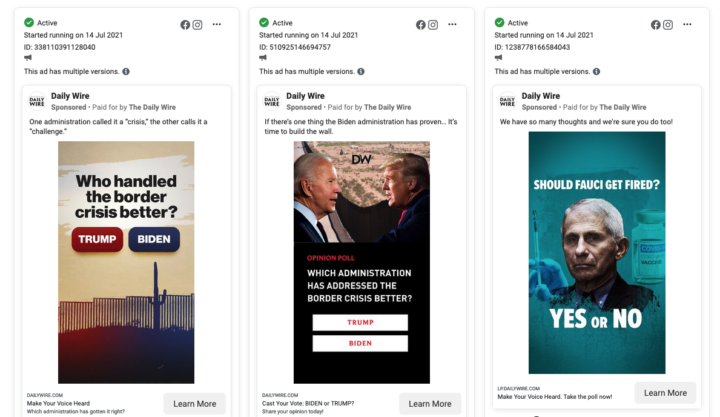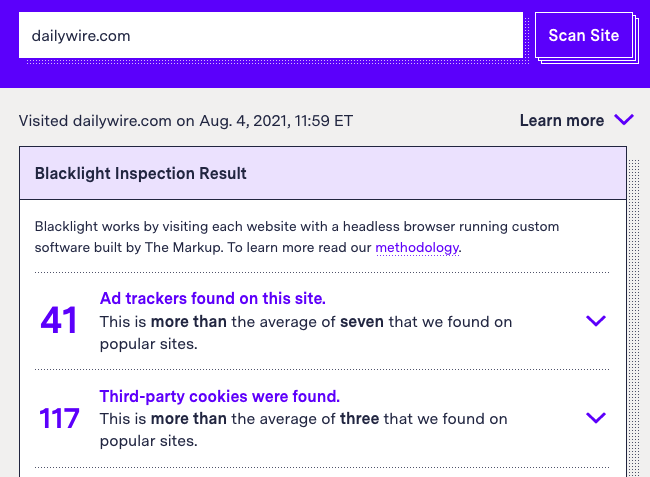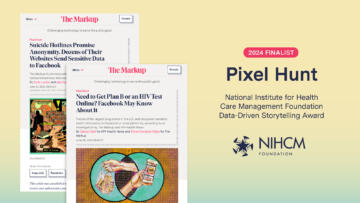Ben Shapiro, co-founder of The Daily Wire, a conservative media company, has mastered Facebook’s complex algorithms like no one else, posting links to stories from his publication that rank among the top 10 best performing posts on Facebook day after day after day.
What’s the key to his success?
As a recent NPR analysis shows, The Daily Wire’s sensationalist headlines garner a ton of engagement on a platform that rewards explosive content. But The Daily Wire is also a sophisticated user of Facebook’s advertising targeting tools to pinpoint users likely to be receptive to its outrage-driven brand of conservative content, The Markup has found.
Using data from our Citizen Browser project, we pulled targeting information from 241 Daily Wire ads that ran on Facebook between April 15 and July 15, 2021. We found that The Daily Wire largely chose to target people whom Facebook had pegged as interested in Fox News, Donald Trump, Rush Limbaugh, and other conservative mainstays, as well as individuals Facebook determined were characteristically or demographically similar to The Daily Wire’s existing audience members. (See our data here.)
Citizen Browser consists of a panel of roughly 1,800 Facebook users across the country who voluntarily share their Facebook news feed data with The Markup—providing a rare, albeit relatively small, window into what different people see on the platform.
By contrast, The New York Times—one of the largest legacy media publications in the U.S.—took a different tack in its Facebook advertising, targeting users according to the topics of the articles. So, for instance, an article about a band could be targeted to Facebook users with “music” listed in their ad interests. (Facebook says it determines users’ interests based on their past activities on the platform but has been somewhat cagey about how exactly this is done.)
Of the two publications, The Daily Wire used interest targeting more frequently than The New York Times did: 39.3 percent of Daily Wire ads versus 23.5 percent of ads from the Times were targeted in this way.
The table below shows the top 10 interests targeted in sponsored posts from both outlets:
| THE DAILY WIRE | THE NEW YORK TIMES | ||||
| Interest | Ad Count | Interest | Ad Count | ||
|---|---|---|---|---|---|
| Fox News Channel | 32 | Research | 47 | ||
| Conservatism in the United States | 31 | Music | 44 | ||
| Ben Shapiro | 31 | Arts and music | 43 | ||
| Donald Trump | 23 | Science | 38 | ||
| Glenn Beck | 22 | Photography | 38 | ||
| The Daily Caller | 17 | Family and relationships | 34 | ||
| National Review | 14 | National park | 29 | ||
| Bill O'Reilly (political commentator) | 11 | Cooking | 28 | ||
| Rush Limbaugh | 10 | Restaurants | 27 | ||
| Sean Hannity | 9 | PBS | 27 | ||
While the Times mostly targets topical interests, of the top 20 interests targeted by The Daily Wire, only one (“American Football”) was not directly tied to conservative media or politics.
The Daily Wire also frequently made use of Facebook’s “lookalike audiences” feature to show content to new audiences of users who do not follow the page but share characteristics with those who do. In our dataset, 37.9 percent of Daily Wire posts used this type of targeting. The New York Times also used this targeting type, albeit rarely: Only 3.6 percent of its sponsored posts in our dataset targeted lookalike audiences.
“As you’re looking at this dataset, to me it shows that mainstream media outlets like The New York Times are still approaching the internet as a collective space in which you could potentially learn about anything, from ‘research’ or ‘science’ to ‘family and relationships,’ ” Francesca Tripodi, an assistant professor at UNC School of Information and Library Science at Chapel Hill, said. “But Daily Wire, if you’re saying, ‘We only want to target people who are interested in conservatism in America,’ that creates this bifurcated or dual internet, and that allows for information to circulate unchecked.”
Facebook advertising is designed to use personal data points about its users to guess what sorts of products they might like, she said, but there’s a fundamental difference between a food brand serving ads to people who like potato chips and a news brand serving information to people who like conservatism.
“[Daily Wire] is using the same tactics that these corporate entities are using but to create siloed interests around information,” Tripodi said.
Neither The Daily Wire nor Facebook responded to multiple requests for comment.
Beyond Facebook’s powerful data-gathering system, The Daily Wire amasses its own information on readers and potential readers.
The Markup also scanned Daily Wire ads in the Facebook ad library, which contains a broader range of ads than those seen by Citizen Browser panelists but does not disclose targeting information. Over a three-month period, from May through July, the ad library displayed 47 unique ads from The Daily Wire. Of these, 22 were survey-style ads prompting users to respond to emotive political questions.
Clicking the ad takes users away from Facebook and onto the dailywire.com domain, where they are asked to enter an email address in order to respond.
Over the same time period, no New York Times ads available in the ad library used this technique.
The Daily Wire’s website also contains an unusually high number of data-gathering trackers.
A scan from Blacklight, a website privacy inspector built by The Markup, on Aug. 4, 2021, turned up 41 ad trackers and 117 third-party cookies on the homepage. By contrast, The Markup’s scan of 100,000 of the most popular websites in September 2020 found an average of seven ad trackers and only three third-party cookies per site.
The site also uses Facebook’s bespoke Pixel tracking code to send data back to the social platform about users who have visited the site, which The Daily Wire can use to further tweak ad targeting and build new lookalike audiences.
“What you’ve shown here is clear evidence of the way in which the radicalization of our society is built on many facets of the algorithm, including the tools provided for ad targeting,” said Cameron Hickey, project director for algorithmic transparency at the National Conference on Citizenship.
Questions about the ethics of using data-driven profiling to target political messages are not new. Perhaps most famously, the British political consulting firm Cambridge Analytica purported to create detailed psychological profiles of Facebook users and shared those with the campaign of former president Donald Trump. While profiling has been a part of politics for decades to some extent, figures ranging from former Facebook insiders to Federal Election Commission officials have raised alarms over the kind of microtargeting that social media allows. (The European Commission is also considering including a ban on microtargeting in its landmark Digital Services Act package, which is making its way through the European Parliament and the Council of the European Union.)
That said, The Daily Wire’s targeting choices are widely accepted as routine, its success on Facebook more of a feature of the platform’s workings than a bug in the system, said Katie Joseff, a research fellow at the Center for Media Engagement at the University of Texas at Austin.
“These platforms, when you look at Facebook and YouTube in particular, they want people on there who are engaging their users because then there’s more users and user time overall,” Joseff said. “So [The Daily Wire] is definitely playing into the structure as it was created and doing it well.”







